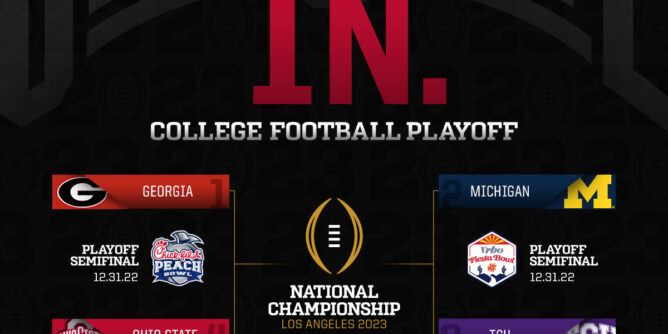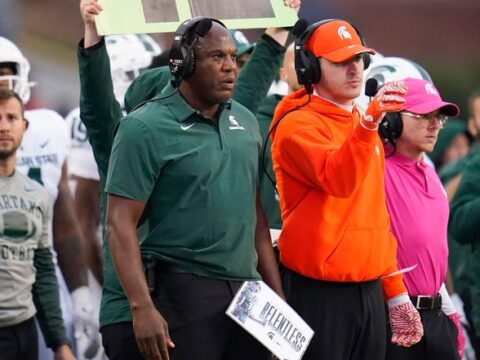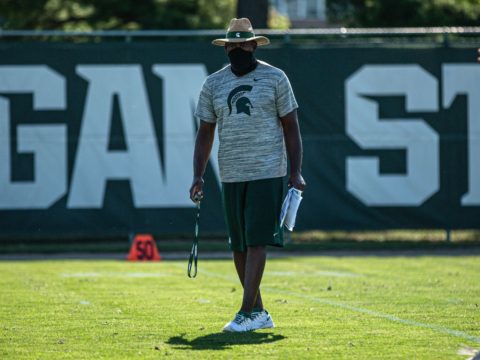
Note: Georgia just won the College Football Playoffs and I thought it worthwhile to re-examine the divergent paths that separated Georgia and Michigan State since they played in the 2011 Outback Bowl so this article is longer than most. Despite its length, I hope you find it informative and Thank you for reading Will2Win.
Georgia beat Ohio State as well as TCU in the College Football Playoffs and finished the season with a stunningly impressive 15-0 record, an SEC Championship and a National Title, which was their second national title in last two years.
Meanwhile, Michigan State finished the season with a record of 5-7 overall (3-6 Big Ten) tied for #10 Big Ten while CBS Sports ranked the Spartans #73 in the land, just ahead of UAB, Appalachian State and Middle Tennessee.
It was the Spartans second losing season in three years.
Yet, not so long ago, Georgia and Michigan State were simultaneously climbing the championship mountain.
In 2011, the programs were rising at an remarkably equal pace and in that year, Georgia posted a 10-3 record (7-1 SEC) and tied for SEC East.
Meanwhile Michigan State posted a 10-3 record (7-1 Big Ten) and finished 1st in the Legends Division.
Georgia and Michigan State played in the 2011 Outback Bowl highlighted by Jerel Worthy blocking a game tying FG in the 3rd OT, and the Spartans went on to beat Georgia 33-30 and finished the season ranked #10 in the Coaches Poll.
At that time, the future looked bright for both programs as their respective trajectories were trending north.
Mark Richt was Head Coach at Georgia at that time and for the next 4 years he posted an impressive record of 40-13 overall, (23-9 SEC) highlighted by #4 and #9 rankings in 2012 and 2014 respectively.
Meanwhile, Mark Dantonio was Head Coach at Michigan State and for the next 4 years he posted an equally impressive record of 43-11 overall, (25-7) Big Ten and from 2012 to 2015 the Spartans won 3 Big Ten Division titles, 2 outright Big Ten titles, a Rose Bowl, a Cotton Bowl, and the Spartans earned an invitation to the College Football Playoff,
Moreover, from 2013 to 2015 the Spartans earned consecutive rankings of #3, #5 and #6 which was their first Top 5 rankings since 1965 and 1966. So, after years of frustration, Michigan State Football had climbed back into the National Championship conversation as one of the best coached teams in the land.
In 2016, Georgia and Michigan State take decidedly divergent paths:
Interestingly, Mark Richt was fired at Georgia despite a 15-year career whereby he posted an auspicious overall record of 145-51 (74%) the highest winning percentage of any coach in Georgia’s esteemed football history, yet Mark Richt was reputedly fired because he failed to win a national title.
Of course, Mark Richt was replaced by Kirby Smart.
Smart was the longtime Assistant Head Coach and Defensive Coordinator at Alabama and built some of Nick Saban’s most dominating defenses.
It was a fortuitous coaching change because since taking the reins at Georgia, Smart has compiled an extraordinary record of 81-15 (84%) including 48-9 SEC (84%) and his achievements include 6 Top 10 finishes while winning “back-to-back” National titles in 2021 and 2022 respectively.
Meanwhile, Mark Dantonio continued on at Michigan State until 2019, but the “heavy lifting” of cleaning up the debacle left behind by Bobby Williams and John L. Smith, and the daunting drama of the Larry Nassar scandal which surfaced in December 2016 took its toll. After getting close to the summit, Mark Dantonio grew weary.
Consequently, from 2016 to 2019 the trajectory for Spartan Football went south as Dantonio posted a dismal 27-24 record overall, (17-17 Big Ten) with zero Top 10 finishes.
It would be fair to say, all the good will achieved by Mark Dantonio from 2007 to 2015 were offset by his remarkably dismal record from 2016 to 2019.
The fall from grace should have sounded warning signals throughout Michigan State athletic administration, especially a dismal 3-9 record in 2016, (1-8 Big Ten) including an abundance of off field issues, yet the warning signs went unheeded because the Larry Nassar drama took center stage and dominated the institutional narrative.
By 2020, Michigan State and Georgia were decidedly on different paths and headed in opposite directions and all the good will achieved by Michigan State Football during its ascent to the CFP was lost as Spartan Football declined into mediocrity.
Mark Dantonio finally stood down in 2020 after posting a 6-6 regular season record in 2019, (4-5 Big Ten) including #52 final season ranking, while Kirby Smart posted a record of 12-2 overall, (7-1 SEC) and finished #4 in the land.
Astute AD’s demonstrate temerity to make bold organizational moves:
College Football remains a game of organizational architecture (building rosters, hiring the best coordinators, game planning and play calling) and success goes to the most astute AD’s who hire the best Coaches.
Let’s remember, Georgia demonstrated organizational temerity by firing Mark Richt despite the fact he won 74% of his games over 15 seasons which included 5, SEC Division titles, yet he was fired because he failed to win a national title.
Similarly, TCU fired Gary Patterson after a long and distinguished 21-year career because he failed to consistently win Big 12 titles.
It took organizational temerity to fire Patterson because over 21 years Gary Patterson posted an impressive record of 181-79 (70%) and took TCU from football obscurity to football relevance by compiling 7 Top 10 finishes as it ascended thru 3 different conferences including WAC; Conference USA; and Mountain West.
Yet, upon becoming a member of Big 12, Patterson was only able to capture one title in 10 years, and so TCU determined Patterson was incapable of getting TCU to the Promised Land and rendered a decision to fire Gary Patterson.
Of course, TCU didn’t fire Patterson without a coherent plan and TCU promptly hired Sonny Dykes who had posted an impressive 30-18 record at SMU.
It was an auspicious coaching change because Dykes immediately posted a 13-2 record in his first season at TCU (9-0 Big 12) and thereby earned an invitation to the College Football Playoffs.
It’s also notable, Wisconsin had the organizational temerity to fire Paul Chryst in 2022 despite the fact he won 72% of his games over 8 years including 3 Big Ten West titles, yet he was fired because he failed to win an outright Big Ten Title.
Of course, Wisconsin didn’t fire Chryst without a coherent plan and in turn hired the highly regarded Luke Fickell who put Cincinnati Football on the map of football relevance.
Let’s recall, over his last 5 years at Cincinnati, Fickell compiled an extraordinary record of 53-10, including 2 unbeaten seasons; 2 Top 10 finishes and earned an unprecedented invitation to the College Football Playoff as a Group of 5 school.
Coherent organizational planning:
In each of the preceding scenarios, Georgia, TCU, and Wisconsin demonstrated coherent planning and organizational temerity to part company with a “winning coach” and replace each with a “championship caliber coach” as part of a plan to take their respective programs to the next level.
In each case, the decisions were guided by savvy, astute AD’s.
The list also includes Michigan which stayed focused upon the goal of returning to football elite.
Let’s remember, Michigan churned thru Lloyd Carr, Rich Rodriguez and Brady Hoke before finally settling upon Jim Harbaugh.
Of course, Jim Harbaugh posted winning records at University of San Diego, Stanford and San Francisco 49ers before being hired by Michigan.
Of course, Harbaugh replaced Brady Hoke despite the fact Hoke posted a 31-20 record including a victory over Ohio State in his first season, yet he lost the next 3 to the Buck’s and Michigan determined Hoke would be incapable of consistently competing with Ohio State or getting to the Promised Land and so they fired Hoke and hired Harbaugh.
Of course, USC had the organizational temerity to fire Clay Helton despite posting a 46-24 record including 2, Top 10 finishes and 3 PAC 12 Division titles, yet USC knew Helton was incapable of taking the Trojans to the Promised Land and so USC fired Helton and hired Lincoln Riley.
Lincoln Riley of course posted an auspicious 55-10 record at Oklahoma including 3 Big 12 titles, 4 double digit winning seasons and 5 Top 10 finishes. In his first season at USC, Riley posted an impressive 11-3 record which promises bright future for USC Football.
In each of the preceding cases including Georgia, TCU, Wisconsin, Michigan and USC, each were committed to winning championships and thereby demonstrated coherent planning and organizational temerity to part company with a coach who had a winning record yet incapable of getting to the Promised Land.
Coherent coaching search or “Spin the Wheel of Fortune”?
Meanwhile, Michigan State hired Mel Tucker.
Let’s remember, Mel Tucker had a sketchy resume as a Head Coach, just one season at lowly Colorado where he posted an upside down record of 5-7 overall (3-6 PAC 12) and ranked #75 in the land.
Not exactly a distinguished resume when compared to Kirby Smart, Sonny Dykes, Luke Fickell, Jim Harbaugh, Lincoln Riley, etc, etc, etc.
But let’s be clear, Michigan State didn’t exactly conduct a “state of the art” coaching search after Mark Dantonio stepped down.
By all accounts, MSU did not have a “short list” of potential head coaching candidates to interview in the event of sudden turnover, and that was an unforgivable and egregious blunder.
I want to be respectful to Bill Beekman the AD at that time because he was in an untenable situation and should have never been put into that position.
Let’s remember, Lou Anna Simon stepped down as MSU President in Jan 2018 in the wake of the Larry Nassar scandal, quickly followed by Mark Hollis stepping down as AD.
Of course, Simon and Hollis were the driving forces behind Mark Dantonio being hired as Michigan State Head Football Coach, and administratively they delivered nearly a decade of football excellence to Michigan State University, but now that entire triumvirate was gone.
Subsequently, former governor John Engler was appointed interim President in Jan 2018, and in turn he appointed Bill Beekman, a career general administrator mostly in health and finance to become Interim AD.
OK, so far so good…because it was important to stabilize administrative functions, yet permanent directors and administrators were desperately needed.
At that point, MSU should have conducted a national search to find a top echelon, highly qualified “permanent” AD to properly steer an athletic complex with 25 sports including more than 700 athletes and a $200 Million operating budget which is what Engler promised. But that didn’t happen.
In fact, in July 2018 (after just 6 months as Interim AD) Bill Beekman was named permanent AD although Beekman had “ZERO” experience in sports administration.
It’s also head scratching because Beekman’s appointment as permanent AD was executed by John Engler who carried the title interim President.
To most observers…that sounds less like coherent planning and more like “Spin the Wheel of Fortune”!
It was clear, Michigan State administrators had their collective eyes on the legal issues surrounding the Larry Nassar scandal so they were squarely caught flat footed when Mark Dantonio stepped down.
Of course, there was no succession plan for a Head Football Coach and there was no “short list” of candidates, and that’s unforgivable in the high stakes game of college football.
Where was the short list?
It’s worth noting, Barry Alvarez, Wisconsin’s legendary AD was renowned for obsessively maintaining a “short list” of head coaching candidates in his desk drawer, which he consistently reviewed and edited.
Alvarez also maintained intermittent contact with every name on his “short list”, so it wasn’t simply a “wish list” it was a well researched “short list”,
It proved to be a practicable tool because Alvarez made three reasonably successful coaching changes during his long tenure as AD including Bret Bielema, Gary Andersen, and Paul Chryst, each of whom won Big Ten West Championships and appeared in 6 Big Ten Championship Games which is tied with Ohio State for most appearances.
Yet the value of a “short list” eluded Michigan State.
By all accounts, after 2 years as AD, Bill Beekman still didn’t have a “short list”, but let’s be clear he had “ZERO” experience in sports administration so the absence of short list was not surprising.
Therefore, given the fact Michigan State was caught flat footed, it could have (and should have) appointed Mike Tressel a highly regarded Defensive Coordinator from Mark Dantonio’s staff as “interim head coach” and thereby “buy time” to conceive a coherent coaching search for the following season.
Yet, Michigan State panicked and rushed to meet Luke Fickell…but Luke Fickell really didn’t like the lay of the land at Michigan State given its administrative chaos.
After all, Engler was forced to resign from his role as interim President due to clumsy PR gaffes, while President Stanley, who was hired in May 2019 from Stony Brook University, had virtually zero experience with big time athletics and of course, MSU was still operating with an inexperienced Athletic Director.
Not a good recipe for success.
By all accounts, none of that set well with Fickell who learned well during his time as player, Defensive Coordinator, and Interim Head at Ohio State where organizational glitches are too few to mention.
It should also be noted, MSU Board of Trustees was proving to be tone deaf to the needs of Michigan State Football and MSU newly appointed President was clueless regarding the value of Football as a revenue producing sport.
No “Agreement in Principle” …no deal:
We must make this point:
In business and political deal making, there is a well-founded practice of achieving an “agreement in principle” prior to engaging in final negotiations.
In other words, an “Agreement in Principle” is a “quid pro quo” proposition which means key elements of the proposed agreement are laid out first, such as: “we will do this…if you do that…do we have an agreement?”.
In fact, no business or institution should ever engage in a public hiring expedition in full view of the cameras without first achieving an “agreement in principle”, or said another way, if there is no “agreement in principle” then it’s simply a “public fishing expedition”.
Consequently Michigan State was rebuffed by Luke Fickell and thereby publicly humiliated all because there was no “agreement in principle”. So Michigan State AD came home to the eyes of the world with an “empty catch”.
It was public humiliation of the highest order for a proud university that was still suffering thru the Larry Nassar fallout.
Meanwhile, after being publicly rebuffed by Luke Fickell, and given the fact MSU AD had “ZERO” experience negotiating multimillion dollar contracts with savvy football coaches, nevertheless the AD quickly deployed what could be described as another desperate plan.
The Spartans AD got back on a corporate jet and flew to Colorado whereby he presented an offer to Mel Tucker (once again, it was an offer without an “agreement in principle”) and once again the AD came home empty catch. All visible to the public.
So, given the fact Michigan State was desperate and throwing good money after bad, the AD returned to Colorado for a second time, this time doubling the offer and suddenly Mel Tucker accepted the offer and declared Michigan State was his “dream job”.
Please excuse me for being cynical but I don’t believe for a moment that MSU was Mel Tucker’s “dream job” otherwise he would have accepted the first offer. Perhaps it was his “dream compensation”, but not dream job.
At any measure, Michigan State hired Mel Tucker despite a 5-7 losing record and let’s be honest, his resume paled compared to the auspicious credentials put forth by Kirby Smart, Sonny Dykes, Luke Fickell, Jim Harbaugh, Lincoln Riley, etc, etc, etc…and we could also name Kalen DeBoer, Deion Sanders and many others.
After all, Mel Tucker posted a 2-3 record as interim Head Coach with Jacksonville Jaguars as well as a 5-7 record at Colorado (just 3-6 in PAC 12) and nowhere was there a winning record as Head Coach.
There is plenty of rationalization amongst Spartan partisans, but by any name, Michigan State hired a coach with a losing record hoping he could catch lightning in a bottle.
At the bottom line: Mel Tucker is out of “Gimme’s”
No more “Mulligans” and no more “Gimme’s”: it’s time for Mel Tucker to earn his $95 million compensation!
This season will commence Mel Tucker’s 5th year as Head Football Coach and so far he has posted three losing seasons: one losing season at Colorado and 2 losing seasons at Michigan State, so it would be fair to say 3 losing seasons out of 4 doesn’t resonate optimism for future success.
So, if Mel Tucker has the coaching acumen he touted when he was hired, then he needs to prove his worth by competing for a Big Ten Championship in 2023…no excuses…no mulligans…no gimme’s.
And when will MT compete for a National Title?
After watching Georgia beat Ohio State and then pound TCU into submission 65-7 in the CFP, it’s a stark reminder that Spartan Football seems to be light years from a national title.
It’s hard to write a script with a larger discrepancy because Georgia finished with a record of 15-0 and earned its second national title in two years, while the Spartans finished 5-7 (3-6 Big Ten) and #73 in the land, compiling its second losing season in 3 years.
Yet, not so long ago, Georgia and Michigan State were simultaneously climbing the championship mountain but coherent planning at Georgia and “head scratching” lack of coherent planning at Michigan State has widened the divide.
Let’s remember, Georgia had the organizational temerity to fire Mark Richt who won 74% of his games because he didn’t win a National Title and thereafter replaced Richt with Kirby Smart, a “Championship caliber coach” who has gotten to the Promised Land twice in the last two years.
What will Alan Haller do?
After all, Mel Tucker has posted 2 losing seasons in just 3 years, and 3 out of 4 if we include Colorado.
Does Haller have the organizational temerity and wherewithal to make the tough calls and force the requisite changes to guide Michigan State Football back to elite?
Will Alan Haller force the narrative that Mel Tucker must change assistant coaches? And if Mel Tucker remains steadfastly reluctant to change assistant coaches, will Alan Haller have the temerity to fire Mel Tucker?
Let’s be honest, Mel Tucker has steadfastly refused to change assistant coaches, which means he intends to “do the same thing” with “the same coaches” and expect a better result. That is not only the definition of “insanity”….it’s also crazy…
Meanwhile Michigan State remains light years from the Promised Land, yet Mel Tucker continues to benefit from a $95 Million compensation package…while stakeholders can only sit and wonder!
Thank you for reading Will2Win and I always welcome your comments and opinions. Of course, you can always click on Will2Win.blog for more stories and previous articles.






